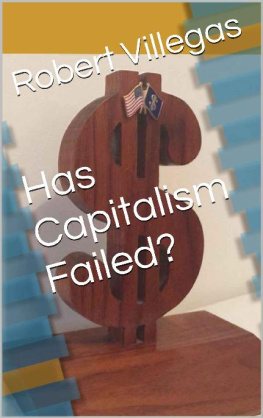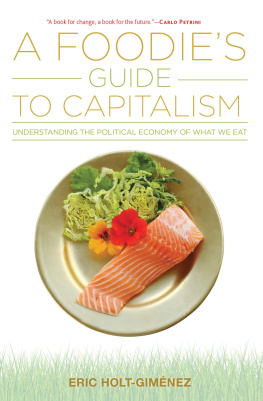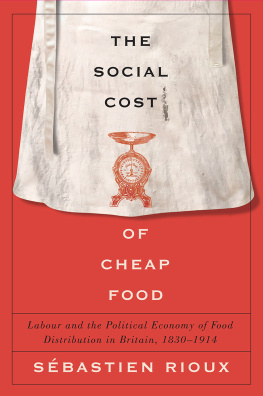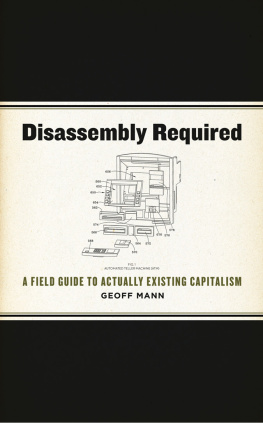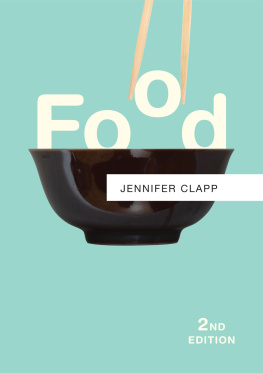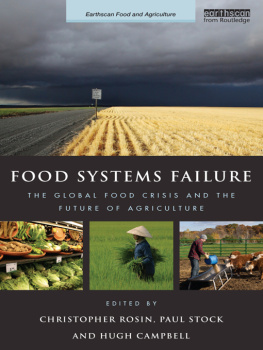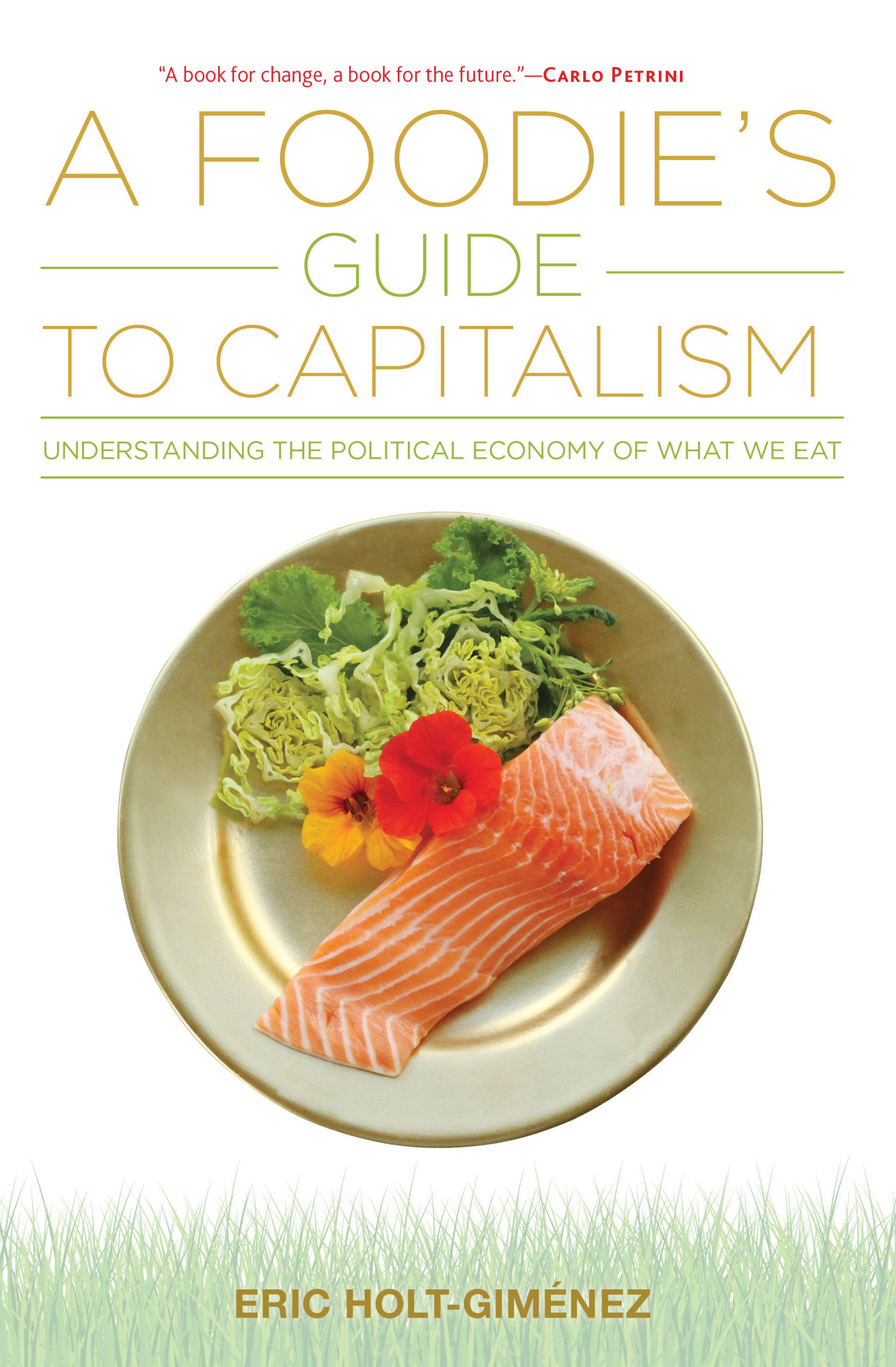ABOUT THE AUTHOR
Eric Holt-Gimnez, Ph.D., is the executive director of Food First/Institute for Food and Development Policy. Previously, Eric served as the Latin America Program Manager for the Bank Information Center in Washington, D.C. He earned a Ph.D. in Environmental Studies from the University of CaliforniaSanta Cruz. He has taught Development Studies at the University of California in Berkeley and Santa Cruz, and for the Boston University Global Ecology Program and graduate courses in food justice, food sovereignty, and agroecology at Marylhurst University, Antioquia University in Colombia, the International University of Gastronomy in Italy, and the University of the Pacific in San Francisco, California. Prior to his work in the United States, he worked as an agroecologist with farmers movements in Central America and Mexico for over 20 years. At Food First, Erics research and writing has concentrated on the global food crisis, the U.S. Farm Bill, the expansion of agrofuels, land issues, racism in the food system, community food security, and social movements for food justice and food sovereignty. Eric is author and editor of the Food First books, Land Justice: Reimagining Land, Food and the Commons in the United States (2017), Food Movements Unite! Strategies to Transform Our Food Systems (2011), Food Rebellions: Crisis and the Hunger for Justice (2009), and Campesino: Voices from Latin Americas Farmer-to-Farmer Movement for Sustainable Agriculture (2006), as well as many academic and magazine articles and blogs.
A FOODIES GUIDE TO CAPITALISM
Understanding the Political Economy of What We Eat
ERIC HOLT-GIMNEZ

Copyright 2017 by Eric Holt-Gimnez
All Rights Reserved
Library of Congress Cataloging-in-Publication Data available from the publisher.
ISBN paper: 978-1-58367-659-2
ISBN cloth: 978-1-58367-660-8
This book is a copublication between Monthly Review Press and Food FirstBooks.
Food First Books is the publishing arm of the Institute for Food and Development Policy, otherwise known as Food First, a member-supported, peoples think tank dedicated to ending the injustices that cause hunger. Since 1975, Food First has advanced this mission through research, education, and action. Food First envisions a world in which all people have access to healthy, ecologically produced, and culturally appropriate food. Our work both informs and amplifies the voices of the social movements actively transforming our food system.
5 4 3 2 1
Text is typeset in Minion Pro and Bliss
Monthly Review Press, New York
monthlyreview.org
Contents
For Manolo: friend, farmer, comrade, who taught me
that hope is not negotiable.
Acknowledgments
THE IDEA FOR THIS BOOK BEGAN with a comradely email conversation with Fred Magdoff, who was interested in producing a book about food and agriculture and asked me for suggestions on a title. Feeling overwhelmed by the plethora of books on food, I replied a little flippantly, How about, The Last Book about Food? Luckily, Fred brushed off my remark. Some time later, over a hearty Vermont breakfast, we went on to outline what eventually became A Foodies Guide to Capitalism. The book, and my own understanding of food and capitalism, benefited greatly from Freds insights, suggestions, and patience during a frustratingly protracted writing process as work, life, and the U.S. elections led to a stream of missed deadlines.
The silver lining in these delays was that I was able to share drafts of the manuscript with a wide range of readers. Once a week for nearly two months, Ilja Van Lammeren, Tasnim Eboute, Francesco Guerreri, McKenna Jaquemet, Ayana Crawford, and Lauren Tate Baeza met with me to review the draft chapters. Their thirst for understanding the capitalist roots of the stunning contradictions in todays food systems was invaluable for developing a text for both seasoned political economists and passionate food activists. Eva Perroni prepared the material for many of the informative boxes. Grace Treffinger and Erik Hazard worked on the glossary. Ahna Kruzic, Alyshia Silva, and Marilyn Borchardt also contributed with suggestions and help with the text, title, and cover. Marion Nestle gave the manuscript a full read, provided many useful comments, and kindly agreed to write the Foreword. Special thanks are in order for the comrades at Monthly Review PressMichael Yates, Martin Paddio, and Susie Day; and to Erin Clermont, whose patient editing and helpful suggestions brought this book to its published form. I especially want to thank my compaera en la lucha y la vida, Leonor Hurtado, whose love, support, creativity, and encouragement were the main ingredients in writing this book. Finally, thanks to everyone who, when hearing about the book project, said, Thats just what we need!
ERIC HOLT-GIMNEZ
GRATON, CALIFORNIA, APRIL 2017
Foreword
by Marion Nestle
WHEN ERIC HOLT-GIMNEZ ASKED ME to introduce his Foodies Guide to Capitalism, I said yes right away. I love the title, I think the food movement needs this book, and I am tired of having to treat capitalism as the C word, never to be mentioned in polite company. Those of us foodies who love to eat and want our food system to produce tastier, healthier, and more sustainable dietsand to provide a decent living to everyone involved in this workneed to bring capitalism out of the closet, understand the problems it causes, and deal with them front and center. Eric (if I may) has done us an enormous favor by producing this book at this time.
We are endlessly told that the American food system gives us an abundant and varied food supply that is the envy of the world. Perhaps, but these purported benefits come at a high cost: food insecurity for 45 million Americans (half of them children), obesity in nearly two-thirds of adults, incalculable damage to the quality of our soil, air, and water, and foods excessively high in calories, sugars, and salt. Capitalism may not be the only explanation for these problems, but it is a great place to begin to understand why they exist.
We need food to live. But the purpose of food companies is not to promote our life, health, or happiness; it is to make money for executives and shareholders. The United Nations may declare that humans have a right to food, realized when every man, woman and child, alone or in community with others, has the physical and economic access at all times to adequate food or means for its procurement, but that is not how unfettered capitalism works. Capitalism turns fooda life essentialinto a commodity to be sold like any other commodity. As Eric puts it:
It doesnt matter if the food is fresh organic arugula or a Big Mac, teff from the highlands of Ethiopia, or Cheez-Whiz from Walmart. It doesnt matter whether you need it or not, whether it is good or bad for you, whether it is locally produced or traveled from afar or whether it was corralled, caged, free range, or led a happy lifeif enough people want it (and have the money to buy it), someone will turn it into a commodity and sell it.
How did something as basic to our existence as food get transformed into an instrument for profit? This book recounts that history and explains its consequences. It addresses questions we should all be asking: Why are so many Americans too poor to buy food? Why do so many gain weight and become obese? Why has the price of fresh fruits and vegetables risen faster than that of soft drinks? Why cant beginning farmers afford to buy land? Why does the USDA consider fruits and vegetables to be specialty crops? Why does the vast majority of our agricultural land grow feed for animals and fuel for cars rather than food for people? Following the money is not a bad way to get to the answers to these questions.


